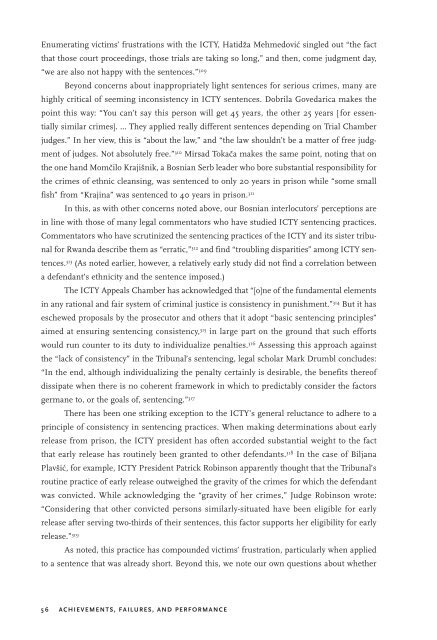That Someone Guilty Be Punished - International Center for ...
That Someone Guilty Be Punished - International Center for ...
That Someone Guilty Be Punished - International Center for ...
You also want an ePaper? Increase the reach of your titles
YUMPU automatically turns print PDFs into web optimized ePapers that Google loves.
Enumerating victims’ frustrations with the ICTY, Hatidža Mehmedović singled out “the fact<br />
that those court proceedings, those trials are taking so long,” and then, come judgment day,<br />
“we are also not happy with the sentences.” 309<br />
<strong>Be</strong>yond concerns about inappropriately light sentences <strong>for</strong> serious crimes, many are<br />
highly critical of seeming inconsistency in ICTY sentences. Dobrila Govedarica makes the<br />
point this way: “You can’t say this person will get 45 years, the other 25 years [ <strong>for</strong> essentially<br />
similar crimes]. … They applied really different sentences depending on Trial Chamber<br />
judges.” In her view, this is “about the law,” and “the law shouldn’t be a matter of free judgment<br />
of judges. Not absolutely free.” 310 Mirsad Tokača makes the same point, noting that on<br />
the one hand Momčilo Krajišnik, a Bosnian Serb leader who bore substantial responsibility <strong>for</strong><br />
the crimes of ethnic cleansing, was sentenced to only 20 years in prison while “some small<br />
fish” from “Krajina” was sentenced to 40 years in prison. 311<br />
In this, as with other concerns noted above, our Bosnian interlocutors’ perceptions are<br />
in line with those of many legal commentators who have studied ICTY sentencing practices.<br />
Commentators who have scrutinized the sentencing practices of the ICTY and its sister tribunal<br />
<strong>for</strong> Rwanda describe them as “erratic,” 312 and find “troubling disparities” among ICTY sentences.<br />
313 (As noted earlier, however, a relatively early study did not find a correlation between<br />
a defendant’s ethnicity and the sentence imposed.)<br />
The ICTY Appeals Chamber has acknowledged that “[o]ne of the fundamental elements<br />
in any rational and fair system of criminal justice is consistency in punishment.” 314 But it has<br />
eschewed proposals by the prosecutor and others that it adopt “basic sentencing principles”<br />
aimed at ensuring sentencing consistency, 315 in large part on the ground that such ef<strong>for</strong>ts<br />
would run counter to its duty to individualize penalties. 316 Assessing this approach against<br />
the “lack of consistency” in the Tribunal’s sentencing, legal scholar Mark Drumbl concludes:<br />
“In the end, although individualizing the penalty certainly is desirable, the benefits thereof<br />
dissipate when there is no coherent framework in which to predictably consider the factors<br />
germane to, or the goals of, sentencing.” 317<br />
There has been one striking exception to the ICTY’s general reluctance to adhere to a<br />
principle of consistency in sentencing practices. When making determinations about early<br />
release from prison, the ICTY president has often accorded substantial weight to the fact<br />
that early release has routinely been granted to other defendants. 318 In the case of Biljana<br />
Plavšić, <strong>for</strong> example, ICTY President Patrick Robinson apparently thought that the Tribunal’s<br />
routine practice of early release outweighed the gravity of the crimes <strong>for</strong> which the defendant<br />
was convicted. While acknowledging the “gravity of her crimes,” Judge Robinson wrote:<br />
“Considering that other convicted persons similarly-situated have been eligible <strong>for</strong> early<br />
release after serving two-thirds of their sentences, this factor supports her eligibility <strong>for</strong> early<br />
release.” 319<br />
As noted, this practice has compounded victims’ frustration, particularly when applied<br />
to a sentence that was already short. <strong>Be</strong>yond this, we note our own questions about whether<br />
56 ACHIEVEMENTS, FAILURES, AND PERFORMANCE

















